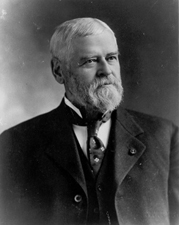Julius C. Burrows
Julius C. Burrows | |
|---|---|
 | |
| United States Senator fromMichigan | |
| In office January 24, 1895 – March 3, 1911 | |
| Preceded by | John Patton, Jr. |
| Succeeded by | Charles E. Townsend |
| Member of the U.S. House of Representatives fromMichigan | |
| In office March 4, 1873 – March 3, 1875 | |
| Preceded by | Wilder D. Foster |
| Succeeded by | Allen Potter |
| Constituency | 4th district |
| In office March 4, 1879 – March 3, 1883 | |
| Preceded by | Edwin W. Keightley |
| Succeeded by | George L. Yaple |
| Constituency | 4th district |
| In office March 4, 1885 – January 23, 1895 | |
| Preceded by | George L. Yaple |
| Succeeded by | Alfred Milnes |
| Constituency | 4th district(1885–93) 3rd district(1893–95) |
| Personal details | |
| Born | January 9, 1837 North East, Pennsylvania |
| Died | November 16, 1915(aged 78) Kalamazoo, Michigan |
| Political party | Republican |
| Profession | Lawyer |
Julius Caesar Burrows(January 9, 1837 – November 16, 1915) was aU.S. Representativeand aU.S. Senatorfrom thestateofMichigan.
Early life and education[edit]

Burrows was born inNorth East, Pennsylvania,and moved then with his parents toAshtabula County, Ohio.He attended district school,Kingsville Academy,andGrand River InstituteinAustinburg, Ohio.He studied law and was admitted to thebaratJefferson, Ohio,in 1859. He moved toRichland, Michigan,in 1860. He was principal of theRichland Seminaryand commenced the practice of law in nearbyKalamazooin 1861.
Military and legal careers[edit]

Burrows raised an infantry company in 1862 to fight in theAmerican Civil Warand served as its captain until the fall of 1863. He was elected circuit court commissioner in 1864 and was prosecuting attorney forKalamazoo County1866-1870. He declined appointment as supervisor of internal revenue for Michigan and Wisconsin in 1868.
Political life[edit]
In 1872, Burrows was elected as aRepublicanfromMichigan's 4th congressional districtto theU.S. House of Representativesfor the43rd Congress,serving from March 4, 1873, to March 3, 1875. He was chairman of theCommittee on Expenditures in the Department of the Navy.
Burrows was an unsuccessful candidate for reelection in 1874, but was subsequently elected to the46thand47th Congresses,serving from March 4, 1879, to March 3, 1883. He was chairman of theCommittee on Territoriesin the 47th Congress.
Burrows is sometimes cited as a contributing factor in whyNew Mexicowas delayed in achieving statehood. In an 1876 debate, Burrows, an admired orator, spoke forcefully in favor of a bill intended to protect the civil rights of freed black slaves.Stephen B. Elkins,theNew Mexico TerritoryDelegate to Congress, arrived late, just as Burrows was finishing. Unaware of the full import of Burrows' speech, Elkins shook his colleague's hand in congratulations, a gesture that many southern congressmen interpreted as support for the civil rights legislation. As a result, Elkin's handshake with Burrows is blamed for costing New Mexico several Southern Democratic votes which had been needed to achieve statehood.[1]While Colorado achieved statehood in 1876, New Mexico remained a territory for another 36 years.
Burrows was an unsuccessful candidate for reelection in 1882. He won re-election in 1884 to the49th Congress,and subsequently to the five succeeding Congresses. He represented Michigan's 4th district from March 4, 1885, until March 3, 1893, andthe 3rd districtfrom March 4, 1893, until his resignation on January 23, 1895, having been electedU.S. Senator.He was chairman of theCommittee on Levees and Improvements of Mississippi Riverin the51st Congress.
Burrows was elected as aRepublicanto theUnited States Senateto fill the vacancy caused by the death ofFrancis B. Stockbridgeand was reelected in 1899 and 1905, serving from January 24, 1895, to March 3, 1911.[2]
He was an unsuccessful candidate for renomination in 1910. He was chairman of theCommittee on Revision of the Laws of the United Statesin the54ththrough56th Congressesand of theCommittee on Privileges and Electionsin the57ththrough61st Congresses.He also served on theLodge Committeewhich investigatedwar crimesin thePhilippine–American War.He was on the imperialist faction[3]led byHenry Cabot Lodgein support of the Philippine–American War. He was also a member of theNational Monetary Commissionand its vice chairman 1908-1912.
After this, Burrows retired from active business pursuits and political life. He died in Kalamazoo and is interred in Mountain Home Cemetery there.
Bibliography[edit]
- American National Biography
- Dictionary of American Biography
- Holsinger, M. Paul. "J.C. Burrows and the Fight Against Mormonism from 1903 to 1907."Michigan History52 (Fall 1968): 181-95
- Orcutt, Dana.Burrows of Michigan and the Republican Party.New York: Longmans, Green and Company, 1917. volsI&II
Footnotes[edit]
- ^Shearer, Benjamin F. (2004).The Uniting States: Louisiana to Ohio.Greenwood Publishing Group. p. 857.ISBN978-0-313-33106-0.
- ^"S. Doc. 58-1 - Fifty-eighth Congress. (Extraordinary session -- beginning November 9, 1903.) Official Congressional Directory for the use of the United States Congress. Compiled under the direction of the Joint Committee on Printing by A.J. Halford. Special edition. Corrections made to November 5, 1903".GovInfo.gov.U.S. Government Printing Office. 9 November 1903. p. 51.Retrieved2 July2023.
- ^Imperialistis a term to differentiate those who supported the Philippine–American War as opposed toAnti-Imperialistswho were against the war. The origin of the two terms comes from the formation of the now defunctAnti-Imperialist League,a group opposed to the annexation and/or invasion of several countries by America between 1898 and 1921. Today it is a common term of historians to use the termImperialistandAnti-Imperialiststo differentiate the differences between the two groups. SeeBenevolent Assimilation: The American Conquest of the Philippines from 1899 to 1903,Stuart Creighton Miller,(Yale University Press, 1982) for an excellent example of this phenomenon throughout the entire book.
External links[edit]
- United States Congress."Julius C. Burrows (id: B001142)".Biographical Directory of the United States Congress.
- 1837 births
- 1915 deaths
- Burials in Michigan
- Republican Party United States senators from Michigan
- Republican Party members of the United States House of Representatives from Michigan
- 19th-century American legislators
- Politicians from Erie County, Pennsylvania
- People from Ashtabula County, Ohio
- People from Richland, Michigan
- Grand River Academy alumni
- Union Army officers
- Military personnel from Pennsylvania
- Military personnel from Michigan



